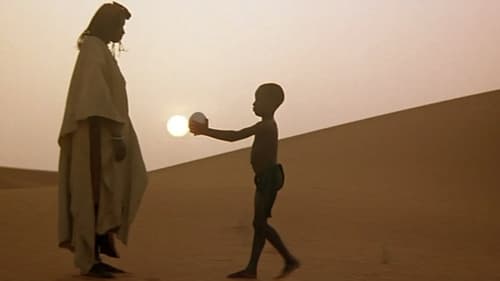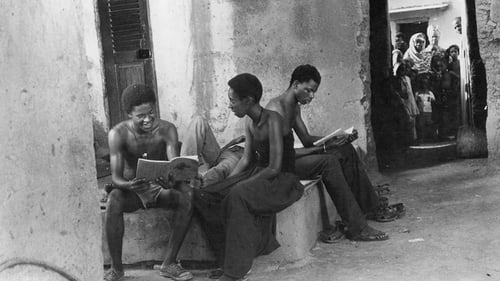Souleymane Cissé
Nascimento : 1940-04-21, Bamako, Mali
História
Souleymane Cissé is a Malian film director. In 1975 he shot Den Muso (The Young Girl), the first full length Malian feature in the Bambara language. It was immediately banned by the government. Then followed Baara (Work) in 1977, Finyè (The Wind) in 1981, and Yeelen (Brightness), Prix du Jury in Cannes in 1987.

Writer
Bamako. Several women are illegally evicted from their home in 2008. Their brother, Souleymane Cissé, takes up his camera to look back at his childhood and family history in a country heading for war despite a tradition of tolerance.

Director
Bamako. Several women are illegally evicted from their home in 2008. Their brother, Souleymane Cissé, takes up his camera to look back at his childhood and family history in a country heading for war despite a tradition of tolerance.

Director
Thirteen filmmakers talk about Henri Langlois and their relationship with him.

Self
Thirteen filmmakers talk about Henri Langlois and their relationship with him.

Director
Meeting of two greats, Cissé's tribute to the dean of African cinema is without discours, without pathos. It is the one returned by his mini camera, which attends the funeral ceremonies that marked the departure of Ousmane Sembene in Dakar, and finds the relatives of Sembene in the house he had built in Yoff, directly on rocks beaten by the ocean. These simple and close images, with a distance from the ceremonial that Sembene would have appreciated, those briefly borrowed from his films and archives, weave a film full of friendship and fraternity.

Writer
A Westernized filmmaker, Issa, is a polygamist whose third wife Mimi is a doctor and high-profile health minister. Accustomed to a certain degree of empowerment and independence from her husband (deciding to stay in her own house instead of moving into his household), Mimi carries on a not-too-subtle affair with the married Abba, a fishmonger who sends her a tell-tale case of fish after each encounter as a token of his affection. Confronted by Issa with his suspicions of infidelity after he finds Abba in the courtyard, Mimi decides to file for divorce, a move that soon brings on a new set of complications, as relatives plead for reconciliation to avoid the shame, Issa's second wife increasingly resents the attention paid to Mimi, and Abba's wife begins to grow suspicious of Mimi's role in her husband's life.

Director
A Westernized filmmaker, Issa, is a polygamist whose third wife Mimi is a doctor and high-profile health minister. Accustomed to a certain degree of empowerment and independence from her husband (deciding to stay in her own house instead of moving into his household), Mimi carries on a not-too-subtle affair with the married Abba, a fishmonger who sends her a tell-tale case of fish after each encounter as a token of his affection. Confronted by Issa with his suspicions of infidelity after he finds Abba in the courtyard, Mimi decides to file for divorce, a move that soon brings on a new set of complications, as relatives plead for reconciliation to avoid the shame, Issa's second wife increasingly resents the attention paid to Mimi, and Abba's wife begins to grow suspicious of Mimi's role in her husband's life.

Producer
Beginning in South Africa under the apartheid regime, the film follows a young girl who flees the country after a violent confrontation with a local white landowner in which her father is killed. She settles in Abidjan, where, ten years later, she has become a university student. As part of her studies, she visits the Taureg tribe on the edge of the Sahara before at last returning to post-Apartheid South Africa.

Writer
Beginning in South Africa under the apartheid regime, the film follows a young girl who flees the country after a violent confrontation with a local white landowner in which her father is killed. She settles in Abidjan, where, ten years later, she has become a university student. As part of her studies, she visits the Taureg tribe on the edge of the Sahara before at last returning to post-Apartheid South Africa.

Director
Beginning in South Africa under the apartheid regime, the film follows a young girl who flees the country after a violent confrontation with a local white landowner in which her father is killed. She settles in Abidjan, where, ten years later, she has become a university student. As part of her studies, she visits the Taureg tribe on the edge of the Sahara before at last returning to post-Apartheid South Africa.

Malian filmmaker Souleymane Cissé reveals his passion for cinema, Africa and the world to Cambodian director Rithy Panh.

Producer
Dotado de poderes mágicos, um jovem parte em busca de seu tio para pedir ajuda em uma luta contra seu pai, um feiticeiro.

Writer
Dotado de poderes mágicos, um jovem parte em busca de seu tio para pedir ajuda em uma luta contra seu pai, um feiticeiro.

Director
Dotado de poderes mágicos, um jovem parte em busca de seu tio para pedir ajuda em uma luta contra seu pai, um feiticeiro.

Producer
Two Malian teenagers, Bah and Batrou, from different backgrounds, meet at secondary school. Bah is the descendent of a great tribal chieftain. Batrous father, a provincial military governor, represents the new ruling power. The two teenagers are part of a generation that rejects the established order and challenges the society in which they live.

Writer
Two Malian teenagers, Bah and Batrou, from different backgrounds, meet at secondary school. Bah is the descendent of a great tribal chieftain. Batrous father, a provincial military governor, represents the new ruling power. The two teenagers are part of a generation that rejects the established order and challenges the society in which they live.

Director
Two Malian teenagers, Bah and Batrou, from different backgrounds, meet at secondary school. Bah is the descendent of a great tribal chieftain. Batrous father, a provincial military governor, represents the new ruling power. The two teenagers are part of a generation that rejects the established order and challenges the society in which they live.

Director
In Rennes, as part of the 5th Traditional Arts Festival in 1978, storytellers and musicians from the Seychelles islands express their concern with modernism and the disinterest of young people in traditional music.

Director
Um jovem malinês deixa o campo para ir morar na cidade, onde passa a ganhar a vida como "baara", os trabalhadores de rua que carregam bagagens e mercadorias pela cidade. Um dia, ele conhece um jovem engenheiro, recém contratado de uma fábrica têxtil, e logo se tornam amigos, por terem vindo da mesma região do país. Isso lhe permite observar de perto o conflito por que passa o jovem engenheiro, dividido entre sua submissão ao cruel e explorador diretor da fábrica e sua simpatia pelos trabalhadores.

Writer
Um jovem malinês deixa o campo para ir morar na cidade, onde passa a ganhar a vida como "baara", os trabalhadores de rua que carregam bagagens e mercadorias pela cidade. Um dia, ele conhece um jovem engenheiro, recém contratado de uma fábrica têxtil, e logo se tornam amigos, por terem vindo da mesma região do país. Isso lhe permite observar de perto o conflito por que passa o jovem engenheiro, dividido entre sua submissão ao cruel e explorador diretor da fábrica e sua simpatia pelos trabalhadores.

Dialogue
A young mute woman is raped and becomes pregnant, with disastrous consequences within her family. The film also sketches the social/economic situation in urban Mali in the 1970s, particularly in relation to the treatment of women.

Script
A young mute woman is raped and becomes pregnant, with disastrous consequences within her family. The film also sketches the social/economic situation in urban Mali in the 1970s, particularly in relation to the treatment of women.

Director
A young mute woman is raped and becomes pregnant, with disastrous consequences within her family. The film also sketches the social/economic situation in urban Mali in the 1970s, particularly in relation to the treatment of women.

Writer
"Cinq jours d’une vie" is about a young man, N'Tji, orphaned at an early age, who lives under the supervision of his uncle. He is sent to Koranic school, where he is forced to memorize and recite verses of the Koran; soon, N’Tji escapes and begins to craft his own destiny. Unfortunately, he is found and thrown in prison, and must live with the implications upon release. In this film, Cissé explores the institution of the Koranic school and its detrimental effects on young people’s autonomy and ability to explore their futures.

Director
"Cinq jours d’une vie" is about a young man, N'Tji, orphaned at an early age, who lives under the supervision of his uncle. He is sent to Koranic school, where he is forced to memorize and recite verses of the Koran; soon, N’Tji escapes and begins to craft his own destiny. Unfortunately, he is found and thrown in prison, and must live with the implications upon release. In this film, Cissé explores the institution of the Koranic school and its detrimental effects on young people’s autonomy and ability to explore their futures.

Director

Director
A portrait of the Malian artist Mamadou Somé Coulibaly who draws his inspiration from the history of the African people.



